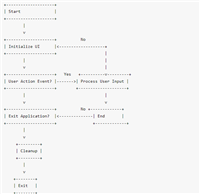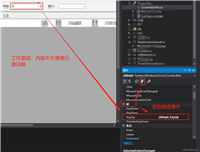c#中的委托(delegate)和事件(event)。委托和事件是c#中非常重要的特性,它们允许你实现回调机制和发布-订阅模式,从而提高代码的灵活性和解耦程度。通过使用委托和事件,你可以编写更加模块化和可扩展的应用程序。以下是一篇关于c#中委托和事件的文章。
引言
委托(delegate)和事件(event)是c#中非常重要的特性,它们允许你实现回调机制和发布-订阅模式,从而提高代码的灵活性和解耦程度。通过使用委托和事件,你可以编写更加模块化和可扩展的应用程序。本文将详细介绍c#中的委托和事件,包括其基本概念、使用方法和应用场景。
委托的基本概念
什么是委托?
委托是一种类型安全的函数指针,它允许你将方法作为参数传递给其他方法。委托定义了一个方法签名,任何符合该签名的方法都可以被委托实例引用。
定义委托
可以通过 delegate 关键字来定义委托类型。
public delegate void notifyhandler(string message);
使用委托
定义了委托后,可以在类中声明委托类型的字段或属性,并在需要时调用委托。
public class notifier
{
public event notifyhandler onnotify;
public void triggernotification(string message)
{
onnotify?.invoke(message); // 调用所有订阅者
}
}
public class subscriber
{
public subscriber(notifier notifier)
{
notifier.onnotify += handlenotification;
}
private void handlenotification(string message)
{
console.writeline($"received notification: {message}");
}
}
// 使用委托
var notifier = new notifier();
var subscriber = new subscriber(notifier);
notifier.triggernotification("hello, world!");内置委托类型
c# 提供了一些内置的委托类型,如 action 和 func,它们简化了常见的委托定义。
action 委托
action 是一个没有返回值的委托,可以接受多个输入参数。
action<string> printaction = console.writeline;
printaction("hello, world!");func 委托
func 是一个有返回值的委托,可以接受多个输入参数。
func<int, int, int> addfunc = (a, b) => a + b; console.writeline(addfunc(3, 5)); // 输出: 8
事件的基本概念
什么是事件?
事件是一种特殊的委托,它允许对象通知其他对象发生了某些事情。事件通常用于实现发布-订阅模式,使得代码更加解耦和模块化。
定义事件
事件基于委托类型定义,通常使用 event 关键字来声明。
public class publisher
{
public event eventhandler<eventargs> somethinghappened;
protected virtual void onsomethinghappened()
{
somethinghappened?.invoke(this, eventargs.empty);
}
public void dosomething()
{
// 模拟发生某件事情
onsomethinghappened();
}
}
public class subscriber
{
public subscriber(publisher publisher)
{
publisher.somethinghappened += publisher_somethinghappened;
}
private void publisher_somethinghappened(object sender, eventargs e)
{
console.writeline("something happened!");
}
}
// 使用事件
var publisher = new publisher();
var subscriber = new subscriber(publisher);
publisher.dosomething(); // 触发事件自定义事件参数
为了传递更多信息,可以创建自定义的事件参数类,继承自 eventargs。
public class customeventargs : eventargs
{
public string message { get; set; }
}
public class publisher
{
public event eventhandler<customeventargs> somethinghappened;
protected virtual void onsomethinghappened(customeventargs e)
{
somethinghappened?.invoke(this, e);
}
public void dosomething(string message)
{
onsomethinghappened(new customeventargs { message = message });
}
}
public class subscriber
{
public subscriber(publisher publisher)
{
publisher.somethinghappened += publisher_somethinghappened;
}
private void publisher_somethinghappened(object sender, customeventargs e)
{
console.writeline($"publisher says: {e.message}");
}
}
// 使用自定义事件参数
var publisher = new publisher();
var subscriber = new subscriber(publisher);
publisher.dosomething("hello, world!"); // 触发事件并传递信息应用场景
用户界面交互
事件广泛应用于用户界面组件之间通信,例如按钮点击、文本框输入等。
button.click += (sender, e) => messagebox.show("button clicked!");数据绑定
事件可用于数据绑定,当数据源发生变化时触发更新。
datasource.propertychanged += (sender, e) => updateui();
日志记录
事件可以用来实现日志记录功能,当某个操作完成时记录相关信息。
logger.logged += (sender, e) => writelogtofile(e.message);
结论
通过使用委托和事件,可以实现灵活的回调机制和发布-订阅模式,从而提高代码的灵活性和解耦程度。委托提供了一种类型安全的方式将方法作为参数传递,而事件则允许对象通知其他对象发生了某些事情。希望本文能够帮助你更好地理解和应用c#中的委托和事件技术。如果你有任何疑问或需要进一步的信息,请随时留言讨论!
希望这篇关于c#中委托和事件的文章对你有所帮助。如果有任何问题或需要进一步的信息,请随时告诉我!
到此这篇关于c# 中的委托与事件:实现灵活的回调机制的文章就介绍到这了,更多相关c# 委托与事件内容请搜索代码网以前的文章或继续浏览下面的相关文章希望大家以后多多支持代码网!






发表评论